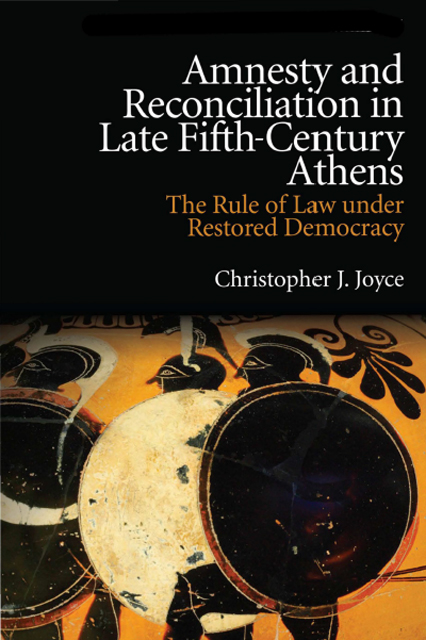Book contents
- Frontmatter
- Contents
- Preface and Acknowledgements
- List of Abbreviations
- 1 Introduction: The Athenian Reconciliation in Modern Scholarship
- 2 Civil Strife at Athens, 404–403
- 3 Oaths and Covenants
- 4 The Legal Scrutiny and the Resurrection of the Rule of Law
- 5 The Amnesty Applied (I): The Trials of Agoratus and Eratosthenes
- 6 The Amnesty Applied (II): The Trials of Callimachus and Socrates
- 7 The Athenian Reconciliation as the Paradigm for the Greek World in the Classical and Hellenistic Ages
- 8 The Rule of Law Restored: The Legacy of the Reconciliation in the Fourth Century
- Bibliography
- Index Locorum
- Subject Index
3 - Oaths and Covenants
Published online by Cambridge University Press: 03 June 2023
- Frontmatter
- Contents
- Preface and Acknowledgements
- List of Abbreviations
- 1 Introduction: The Athenian Reconciliation in Modern Scholarship
- 2 Civil Strife at Athens, 404–403
- 3 Oaths and Covenants
- 4 The Legal Scrutiny and the Resurrection of the Rule of Law
- 5 The Amnesty Applied (I): The Trials of Agoratus and Eratosthenes
- 6 The Amnesty Applied (II): The Trials of Callimachus and Socrates
- 7 The Athenian Reconciliation as the Paradigm for the Greek World in the Classical and Hellenistic Ages
- 8 The Rule of Law Restored: The Legacy of the Reconciliation in the Fourth Century
- Bibliography
- Index Locorum
- Subject Index
Summary
When the disputants came to terms in summer 403, the task they faced was daunting. Athens had been rent apart by the most gruesome civil conflict in memorable history, and the impulse for revenge on both sides must have been fierce. Had it not been for the interventions of the Spartan king Pausanias, civil unrest would have continued indefinitely. Lysias is clear that the democratic forays around the walls of the city were motivated by revenge, and the Three Thousand were not prepared to come to a settlement without a fight (Lys. 25.22). Though scholarly convention has been to speak of a ‘democratic victory’, the reality was somewhat different. Though this was a democratic victory in the sense that a line was drawn under eight months of oligarchy, it would be mistaken to imagine that one party was the victor in a military sense. Athenians reconciled under a Spartan mandate not because one party had decisively beaten the other, but because Spartans had by now understood that unless measures were taken to unite the Athenian citizenry under a tenable government, her allies Thebes and Corinth would get dragged into the military fray, jeopardising chances of a united campaign against Persia in the East. It was therefore essential that Sparta ensure that the basic tenets of the Spartan-led alliance of 404 were reinforced, with the important exception that she was now prepared to recognise that Athens would best be governed under her traditional democracy, and that any attempt to back further the imposed oligarchy of 404 was destined to end in disaster. The treaty of 403 was overseen by a board of ten (or fifteen) Spartan officials. The sources refer to these as diallaktai, cognate with the Greek for a negotiated settlement, diallagê, whose remit was to ensure that the two sides reconciled and enforce this in law.
As noted in Chapter 1, modern discussions of the Athenian Amnesty of 403 have been hampered by definitional problems. It has become a commonplace in scholarship to speak of an ‘amnesty’ which followed on from the victory of Thrasybulus, but the difficulty here is that the terms of the Reconciliation entailed much more than a commitment from one side to the other to discontinue hostilities.
- Type
- Chapter
- Information
- Amnesty and Reconciliation in Late Fifth-Century AthensThe Rule of Law under Restored Democracy, pp. 68 - 89Publisher: Edinburgh University PressPrint publication year: 2022



